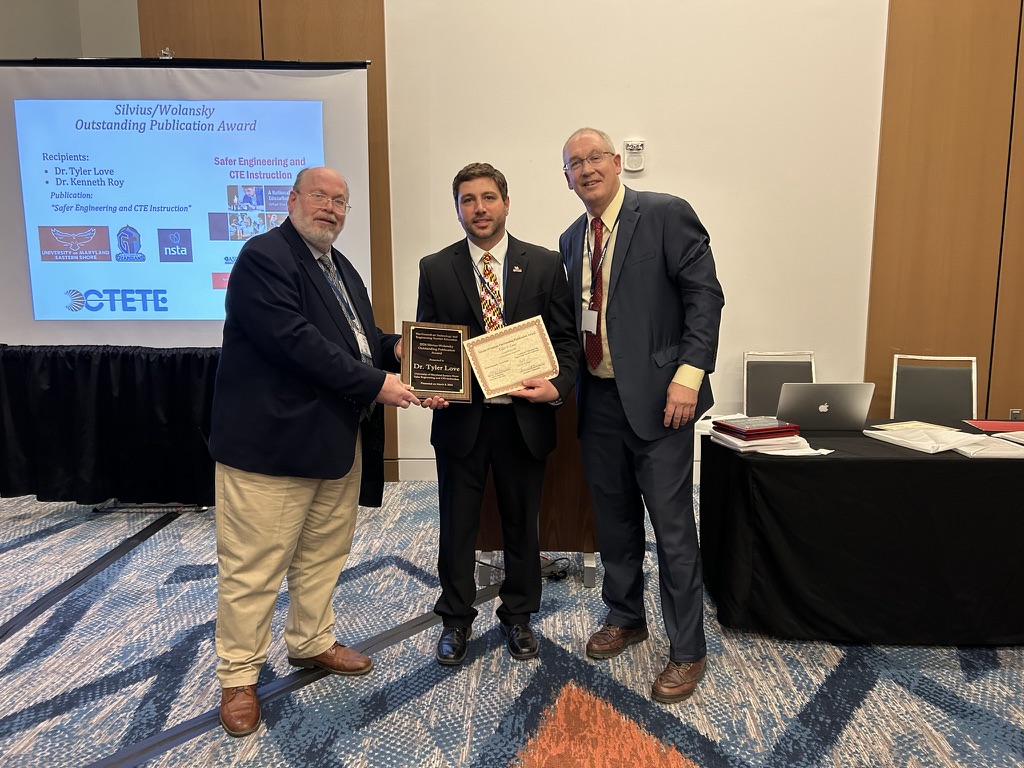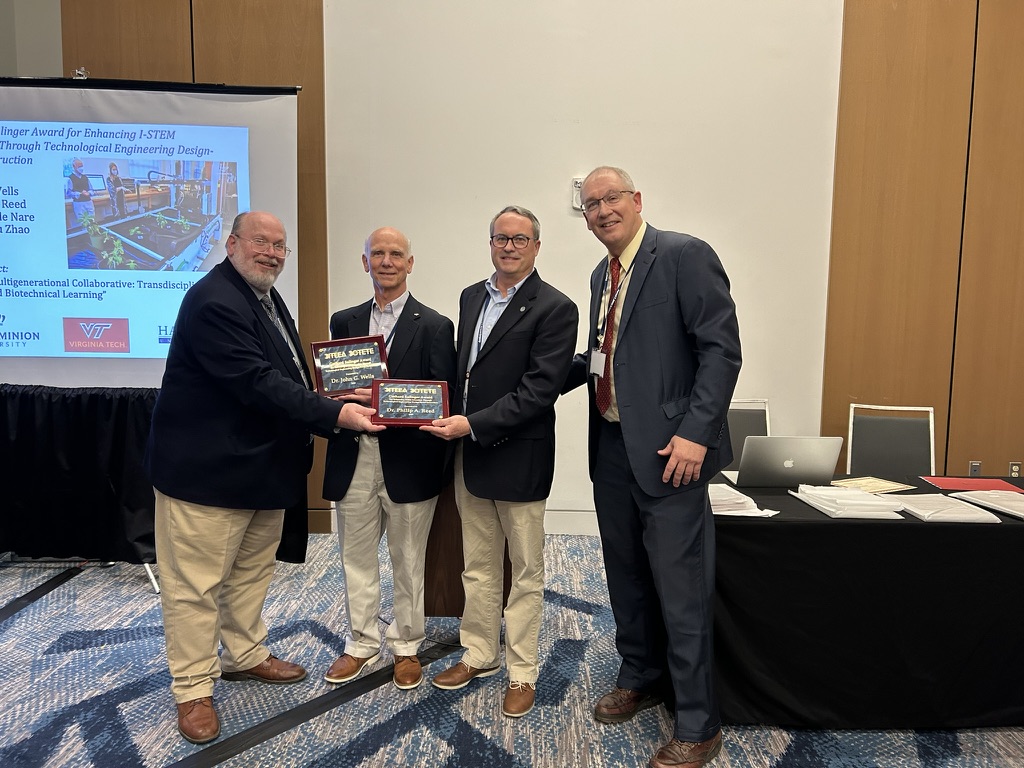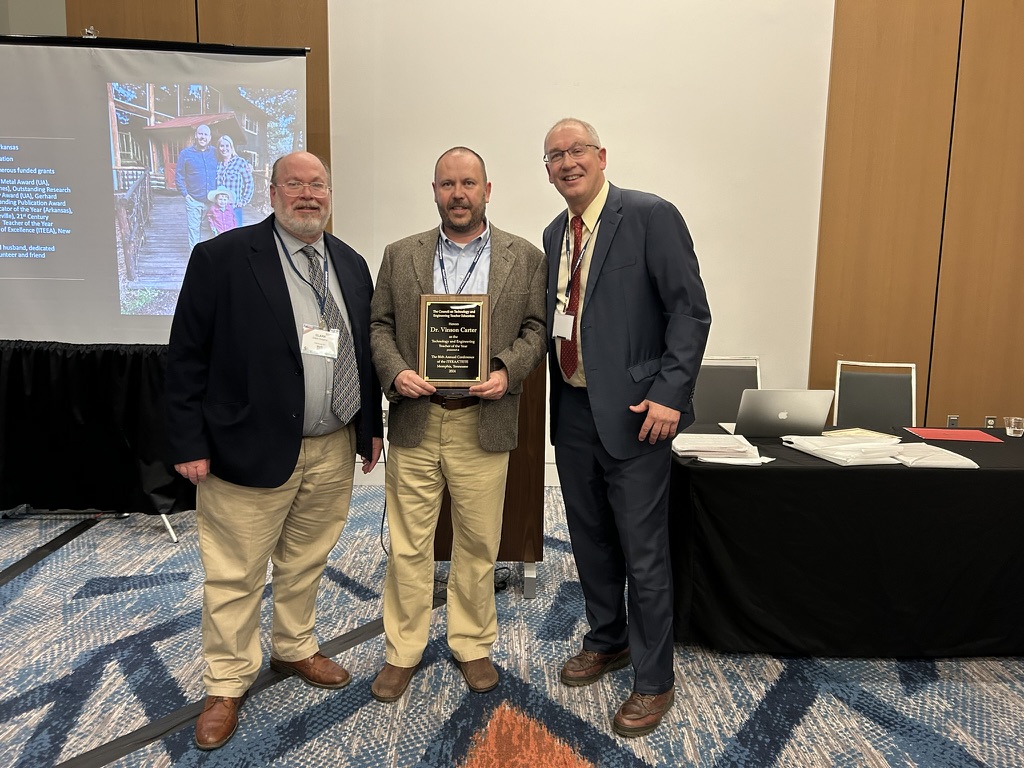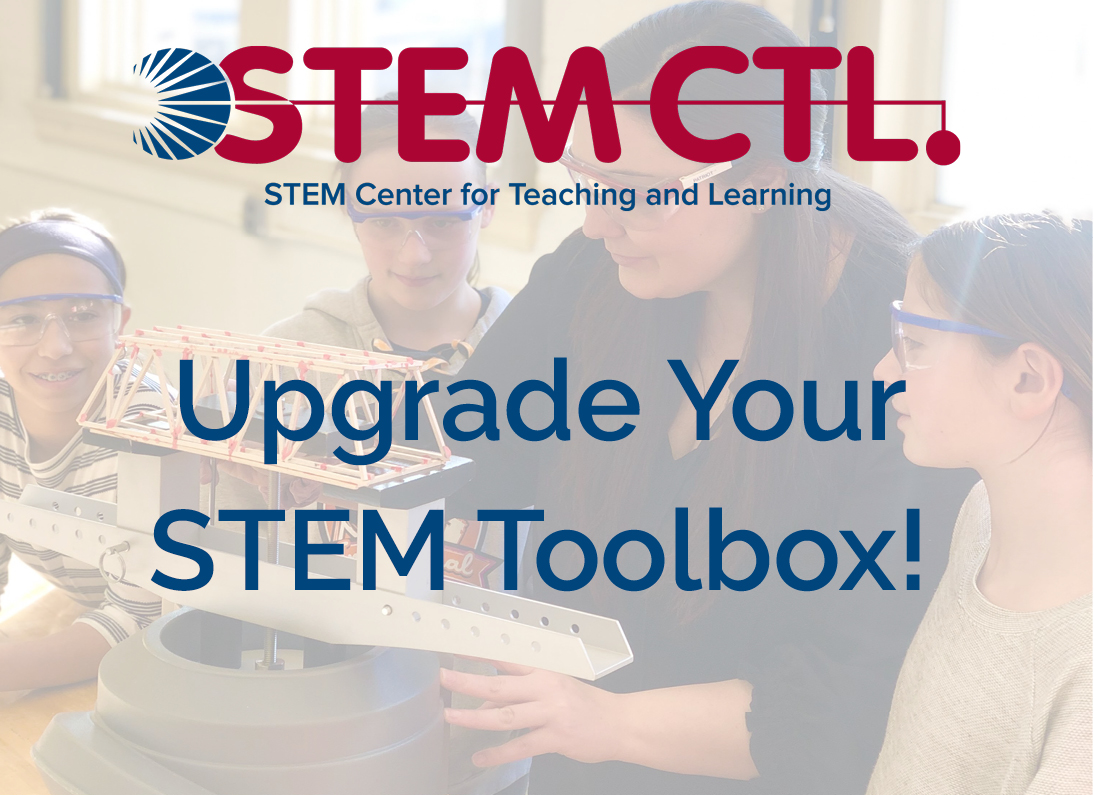CTETE Awards and Recognition
Overview CTETE News Publications (CTETE Members Only)
Resources (CTETE Members Only)
 |
The Council on Technology and Engineering Teacher Education (CTETE) recognizes the contributions of outstanding teacher educators making an impact in technology, engineering, and STEM education. |
CTETE members are eligible for awards and recognition annually, including:
Technology and Engineering Teacher Educator of the Year Award
(DEADLINE: December 31, 2024)
The Technology and Engineering Teacher Educator of the Year Award is the highest honor bestowed by the Council to recognize individuals with established records of service to the CTETE and to the Technology and Engineering education profession.
Nominate/Apply for Teacher Educator of the Year Award
CTETE Outstanding Research Award
(DEADLINE: December 31, 2024)
This award is presented to a member or members of the CTETE who have provided significant service to the profession through the publication of research and related scholarship in the preparation of Technology and Engineering Education teachers or enhancement of professional practice in technology education.
Nominate/Apply for CTETE Outstanding Research Award
Silvius-Wolansky Outstanding Publication Award
(DEADLINE: December 31, 2024)
The Silvius-Wolansky Award for the Outstanding Scholarly Publication in Technology and Engineering Education is co-sponsored by the G. Harold Silvius Foundation and the Council on Technology and Engineering Teacher Education (CTETE). The award is presented annually by the CTETE to an author (or co-authors) whose scholarship has enhanced the Technology and Engineering Education profession.
Nominate/Apply for Silvius-Wolansky Outstanding Publication Award
Gerhard Salinger Award for Enhancing I-STEM Education Through Technological/Engineering Design-Based Instruction
(DEADLINE: December 31, 2024)
This award is presented annually to an individual or team of collaborators whose work has exemplified, promoted, investigated, and/or enhanced teaching and learning in Science, Technology, Engineering, and Mathematics (STEM) through the effective application of technological / engineering design activity. The award was created in honor of Dr. Gerhard Salinger, program officer at the National Science Foundation from 1989 to 2014, whose work to promote the use of engineering design activity and whose advocacy for technology and engineering education has widely influenced STEM education. The award is open to classroom teachers, university educators, school administrators, and others whose contributions are consistent with the selection criteria.
Nominate/Apply for Gerhard Salinger Award for Enhancing I-STEM Education
2024 CTETE Award Winners
Silvius/Wolansky Outstanding Publication Award
Safer Engineering and CTE Instruction

Dr. Tyler Love & Dr. Kenneth Roy
Gerhard Salinger Award for Enhancing I-STEM Education Through Technological Engineering Design-Based Instruction
STEMboy Multigenerational Collaborative: Transdisciplinary T/E Design Based Biotechnical Learning
 Dr. John Wells, Dr. Phillip Reed, Dr. Otsebele Nare & Dr. Bingyu Zhao
Dr. John Wells, Dr. Phillip Reed, Dr. Otsebele Nare & Dr. Bingyu Zhao
CTETE Technology and Engineering Teacher Educator of the Year Award
 Dr. Vinson Carter, University of Arkansas
Dr. Vinson Carter, University of Arkansas
Previous Award Winners
2022 Aaron Clark
2021 Scott Warner
2020 Thomas Loveland
2019 Annette Rose
2018 Edward Reeve
2017 Jim Flowers
2016 Charles McLaughlin
2015 John Wells
2014 Chris Merrill
2013 Philip Reed
2012 William Havice
2011 Marie Hoepfl
2010 Ron Todd
2009 Roger Hill
2008 James Haynie III
2007 Kenneth Welty
2006 Len Litowitz
2005 Michael Scott
2004 Sharon Brusic
2021 Scott Warner
2020 Thomas Loveland
2019 Annette Rose
2018 Edward Reeve
2017 Jim Flowers
2016 Charles McLaughlin
2015 John Wells
2014 Chris Merrill
2013 Philip Reed
2012 William Havice
2011 Marie Hoepfl
2010 Ron Todd
2009 Roger Hill
2008 James Haynie III
2007 Kenneth Welty
2006 Len Litowitz
2005 Michael Scott
2004 Sharon Brusic
2003 Karen F. Zuga
2002 Mark E. Sanders
2001 Michael K. Daugherty
2000 Robert C. Wicklein
1999 Rodney L. Custer
1998 Richard D. Seymour
1997 Anthony Schwaller
1996 Anthony Gilberti
1995 David L. McCrory
1994 Douglas L. Pollete
1993 John M. Ritz
1992 Richard M. Henak
1991 James E. Laporte
1990 John R. Wright
1989 Everett N. Israel
1988 R. Thomas Wright
1987 Lee H. Smalley
1985 Franzie L. Loepp
1984 James J. Buffer, Jr.
1983 Ervin A. Dennis
1982 William E. Dugger, Jr.
1981 David L. Jelden
1980 M. James Bensen
1979 Donald P. Lauda
1978 Daniel L. Householder
1977 Alvin E. Rudisill
1976 William T. Sargent
1975 Lawrence S. Wright
1974 Donald G. Lux
1973 George H. Ditlow
1972 Willis E. Ray
1971 Paul W. DeVore
1970 Donald Maley
1969 Rutherford E. Lockette
1968 Fredrick D. Kagy
1967 Ralph C. Bohn
1966 Robert L. Swanson
1965 Rupert N. Evans
1964 (None Selected)
1963 John L. Feirer
1962 William J. Micheels
1961 Ivan Hostetler
1960 M. Ray Karnes
1959 Kenneth W. Brown
1958 R. Lee Hornbake
1957 Burl Osburn
1956 Gordon Wilber
2023: Dr. Edward Reeve, Utah State University. Status of Trends of STEM Education in the United States of America (2022)
2022: Scott Bartholomew, Nathan Mentzer, Matthew Jones, Derek Sherman, Sweta Baniya. Learning by evaluating (Lbe) through adaptive comparative judgement
2020: Scott Bartholomew, Greg Strimel, and Emily Yoshikawa-Ruesch. Using adaptive comparative judgment for student formative feedback and learning during a middle school design project
2019: Andrew J. Hughes
2018: Moshe Barak & Ben-Gurion
2017: Cameron Denson, Jennifer Beulin, Matthew Lammi, & Susan D’Amico. Developing Instrumentation for Assessing Creativity in Engineering Design
2016: Annette Rose, Steven Shumway, Vinson Carter, & Josh Brown. Identifying Characteristics of Technology and Engineering Teachers Striving for Excellence, Using a Modified Delphi.
2015: Tyler Love & Thomas Loveland. Exploring the Proposition of a Joint Conference Between State Science and Technology and Engineering Education Associations.
2014: Gene Martin & John Ritz. Perceptions of New Doctoral Graduates on the Future of the Profession.
2013: Allison McCulloch & Jeremy Ernst. Estuarine Ecosystems: Using Signature T&E Approaches to Support STEM Instruction.
2012: James C. Flowers. The Problem in Technology Education.
2010: Dennis Herschbach. Technology Education: Foundations & Perspectives
2009: Todd Kelley. Cognitive processes of students participating in two approaches to technology education. Journal of Technology Education, 19(2), 50-64.
2008: Marc deVries, John Dakers, Gene Martin, & Rodney Custer. Analyzing Best Practices.
2007: Stephen Petrina.
2006: Scott Warner & Laura Morford. (2004).The status of design in technology teacher education in the United States. Journal of Technology Education, 15(2) 33-45.
2005: Theodore Lewis. (2004) A turn to engineering: The continuing struggle of technology education for legitimization as a school subject. Journal of Technology Education, 16(1), 21-39.
2003: Philip A. Reed (Ed.). (2001, 2003). CTTE Monograph 17: Technology Education Graduate Research Database.
2002: Mark Sanders. (2001). New paradigm or old wine? The status of technology education practice in the United States. Journal of Technology Education, 12(2), 35-55.
2001: Marcia Braundy, Pat O’Riley, Stephen Petrina, Stephen Dalley, & Annabell Paxton. (2001). Missing XX chromosomes or gender in/equity in design and technology education? The case of British Columbia. Journal of Industrial Teacher Education, 37(3), 54-92.
2000: Theodore Lewis. (1999). Content or process as approaches to technology curriculum: Does it matter come Monday morning? Journal of Technology Education, 11(1), 45-59.
1999: Richard Kimbell. (1997). Assessing technology: International trends in curriculum and assessment. London: Open University Press.
1998: Karen Zuga. (1996). Reclaiming the voices of female and elementary school educators in technology education. Journal of Industrial Teacher Education, 33(3), 23-43.
1997: Robert Wicklein & Roger Hill. (1996). Navigating the straits with research or opinion? Setting the course for technology education. International Journal of Technology and Design Education, 6(1), 31-43.
1996: Rodney Custer. (1996). Performance based education: Implementation handbook for technology education. Columbia, MO: University of Missouri.
2023: Jessica Yauney, Dr. Peter Rich and Dr. Scott Bartholomew, Brigham Young University. A Systematic Review of "Hour of Code" Research
2022: Tyler Love, Reuben S. Asempapa. Teaching Math Modeling through 3D-printing: Examining the influence of an Integrative Professional Development.
2021: Scott Bartholomew, Greg Strimel, Emily Yoshikawa-Ruesch, Senay Purzer, and Liwei Zhang.
2020: Andrew J. Hughes. Measuring Metacognitive Awareness: Applying Multiple, Triangulated, and mixed-methods Approaches for an Encompassing Measure of metacognitive Awareness
2018: Scott Bartholomew & Edward Reeve. Middle School Student Perceptions and Actual Use of Mobile Devices: Highlighting Disconnects in Student Planned and Actual Usage of Mobile Devices in Class
2017: P. John Williams. Looking Back to Move Forward….Again.
2016: John Wells. The Efficacy of Technological/Engineering Design Approach: Imposed Cognitive Demands Within Design-Based Biotechnology Instruction.
2015: Margaret Honey, Greg Pearson, & Heidi Schweingruber. STEM Integration in K-12 Education: Status, Prospects, and an Agenda for Research.
2014: P. John Williams. Investigating the Feasibility of Using Digital Representations of Work for Performance Assessment of Engineering.
2013: Gene Martin & John Ritz. Research Needs for Technology Education.
2012: Mary Annette Rose. Enhancing Environmental Literacy and Assessment Skills.
2011: Michael Hacker.
2010: Michael Hacker, David Burghardt, & Jeanne Christman.
2009: Jennifer Daugherty.
2008: W. James Haynie, III.
2007: Chris Merrill, Rodney Custer, & Jennifer Daugherty.
2005: Cory Culbertson, Michael Daugherty, & Chris Merrill. Effects of modular technology education on junior high school students’ achievement scores.
2003: Anthony Schwaller. Modular technology classrooms and the Standards
for Technological Literacy.
2002: Mark Sanders. Status of Technology Education Programs in the US.
2001: Steven Shumway. A Comparison of Cooperative-Cooperative and Cooperative-Competitive Classroom Goal Structures and Their Effect on Group Problem-Solving Performance and Student Attitudes Toward Their Learning Environment
2023: Dr. Kuen-Yi Lin, National Taiwan Normal University. Apply Engineering Design-Oriented STEM Projects to Develop Engineering Design Thinking Competencies of Pre-service Technology Teachers.
2022: Nathan Mentzer, Andrew Jackson, Ryan Novitski, Rebecca Kramer-Bottiglio. Soft Robotics to Broaden the STEM Pipeline.
2020: Enhancing Computational Thinking and STEM Through Technological/Engineering Design: An International Collaboration to Promote Physical Computing. Tyler Love – Penn State University – Capital Campus & Ronald Todd – The College of New Jersey and New York University.
2019: Millersville University’s Integrated STEM Education Methods Program. Sharon Brusic, Scott Warner, and colleagues
2018: Purdue University’s Department of Technology Leadership and Innovation. Paul Asunda, Scott Bartholomew, Todd Kelley, Nathan Mentzer, and Greg Strimel.
2005 Illinois State University & California University of Pennsylvania
2003 Millersville University & Old Dominion University
1997 Ball State University
1996 California University of Pennsylvania, Millersville University, Old Dominion University & Virginia Tech


